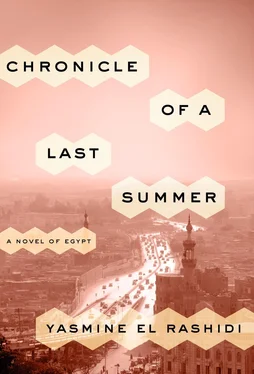One day passes, then another, and nothing has happened, so H’s father says maybe now it was safe to go. Wednesday, midday showing? I nod, as if she can see. Let’s take the metro? I hear her father responding before I do. He screams. Have you lost your mind? I don’t plan on telling Mama, she will worry, and sense my worry too. I don’t know if I’m afraid of death, but I am not keen on being blown up. H believes everything is connected, the stars, the moon, our lives, particles, air, the sea. No matter what you do, you are already figured into a larger program of the universe. Whether she takes the metro or not, if she is meant to be blown up by a bomb, it will happen, one way or another. It will catch up with her, possibly within minutes. It is just a matter of time for scientists to name the theorem. Her conviction intrigues me. In astronomy class the professor had raised one eyebrow as she delivered her hypothesis. He was American, the only American, and asked if she had been watching The Simpsons. The Simpsons ? None of us knew what that was. Yet H still listened to her father, a retired mathematician, who calculated probability for everything. Chances of being blown up. Breaking your leg. Getting an A. Getting married. Getting divorced. Having a car accident. Winning the lottery. Baba coming back? When I asked her why she listened to anyone at all if everything was already predetermined, she shrugged and said it was all programmed, even the listening to her father. And the rescheduling of our cinema plans. Really? What about provoking fate? I get a piercing look. The reports of men throwing acid on women for being indiscreet are exaggerated. She hopes I don’t believe the hype. I do. But what is indiscreet anyway? Wearing short sleeves? Open necklines? Going naked? We all ask this. When had there become such a thing, indiscreet? I decide that H is the happiest, most well-adjusted person I know. I will start my film with her, asking if she is angry.
—
I sit on the sofa opposite Mama. She asks how my day was. Okay. Yours? They caught two terrorists on the road to Sinai. Mama knows I am asking about her day. When she answers about the news, I take it to mean the day was hard. Some afternoons I come home and find the door to Baba’s office ajar. Mama will be sitting on his chair, staring, into nothing. She had stopped asking the lady to clean it months before I realized, and now I could see the dust even through the slight crack of the door, illuminated by rays of sunlight streaming through the wooden shutters. Mama talked more and more about the news. Again she worried about us and Iran. It was no longer about the veil. It didn’t scare anyone, since almost everyone seemed to be wearing it and no one had really changed. A study that plays repeatedly on TV claims eighty percent of veiled women wear it for economic reasons. It means they don’t have to do their hair or buy fancy clothes. It is cheaper to be veiled. The other twenty percent wear it for other reasons. They don’t say what percentage wear it because of religion. It is the terrorists who scare Mama and everyone else now. The only person who doesn’t seem to have fears is Grandmama, not of death or disease or bombs. She says what happens will, I should enjoy every moment I have. I listen intently, wishing Mama worried less too. I look at her, sitting across from me in her robe on the sofa, thinner than she used to be. I wonder about her thoughts.
We are watching Channel One. They are playing a montage of images to the sounds of Verdi’s Aida . They play it often. Every day and now several times a day. I know it well: 1954. Alexandria. Nasser’s speech. The withdrawal of the British from Egypt. Cut. Headshot. The Muslim Brotherhood member who tried to assassinate him that day. He fired eight shots, which missed. Nasser didn’t so much as flinch. He just kept speaking. Let them kill me, he said . If Gamal Abdel Nasser should die, each of you shall be Gamal Abdel Nasser. If Gamal Abdel Nasser should die, each of you shall be Gamal Abdel Nasser. If Gamal Abdel Nasser should die, each of you shall be Gamal Abdel Nasser. If Gamal Abdel Nasser should die, each of you shall be Gamal Abdel Nasser . We are made to write out these words in an exam. After the picture of the attempted killer, they show many of Nasser. In his motorcade. Standing in a convertible waving to the crowds. Leaning forward. Streets lined with millions waving back. The crescendo of the third act of Aida . As I walk in the streets downtown, this montage bookending every other program, I can see people watching, entranced. I begin to realize the power of these montages, these visual narratives of my childhood. We had all seen these scenes innumerable times. Images imprinted on us through repetition. I wonder how to use this in my film. Even the background music, playing as if from memory. I stare at Mama, then turn my head back to the TV. They have moved to Sadat and footage of the October 6 parade, followed by the only image of his wounded and limp body that had ever been seen. Then his wife, children, grandchildren, the international dignitaries at his funeral. They spend extra seconds on photos of Nixon, Ford, Carter. After that come mug shots of the killers. Dark pictures, possibly photocopied, to make faces more blackened, more haunting. To this day I don’t recognize Baba’s cousin, even though I know him by name. His sister is always at Grandmama’s. We call her the Bulldozer, because of her size. She knows this and laughs one day, saying that at least she isn’t the Terrorist like her brother. I want to ask her how she felt about him, how they had turned out so differently after spending the first eleven, twelve, maybe thirteen years of their lives side by side. Did she feel love for him? Did she have any sense of who he would become? I wonder, but it isn’t the kind of thing one is to talk about. I raise it with H instead. She tells me that if she had a brother who killed, she would let him be. Fate and the universe would take revenge. But she would give him the silent treatment. Love him inside but blank him, pretend he wasn’t even in the room, even if he spoke to her. She delivers this with absolute certainty, as if it’s something she has already thought through at length. I wonder what Baba might have done if this were his brother and not his cousin. Baba always used to say that as we age, things change, we become more rigid, and then eventually, most of us, become forgiving again. He called it the cycle of life. Much he had said had been true, the things I remembered anyway. The things he told me. There was much I didn’t know, and many things I imagine I had inherited, borrowed, maybe even imposed on him, the man I wanted him to be, pieced together, fading memories held tight by strands.
Mama and I sit watching TV until the call to prayer. It sounds from the mosque across the river and echoes into the house. The president had issued a decree banning mosque speakers above a certain decibel, but they had become louder again after a few months of quieting down. It’s the most pertinent daily reminder of the increasing antagonism between the Brotherhood and the state. Mama prays but shakes her head every time the muezzin begins to warm his voice into the loudspeaker. Her neck tenses and she shuts her eyes for a moment. God had helped her in the years since Baba left, but it didn’t mean religion had to be imposed like this. They didn’t have to force it all down our throats.
When the massacre had happened, even Amina the housekeeper said she was against this new Islam. She had missed work that day and come on Saturday instead. Mama was still asleep when the doorbell rang. I stuck my head out of the window. Who? She waved and called her name. Mama is sleeping. I can wait. Do you want to leave her a message? I’m coming to work. Today is your day? I didn’t come on Wednesday because of the accident. I buzzed her in. The back steps are narrow. She clasped one side of her galabia in one hand and put her other on the black metal banister. She heaved herself up onto the first step. Paused, and looked up at me. She was already out of breath. I know that she walks twenty minutes to the bus stop from her house. Takes one bus then another. The second drops her off five minutes away. It takes her twenty more minutes to walk those five minutes. She lives in a shed on the roof of a building with a single lightbulb and no running water. I looked at her with a pained expression on my face. I didn’t want to watch her climb the two flights but also felt I should. Can I help? God bless you. I moved my head in awkward acknowledgment. Took half a step back. Watched as she labored her way up.
Читать дальше

![Маргарет Миллар - Rose's Last Summer [= The Lively Corpse]](/books/384369/margaret-millar-rose-s-last-summer-the-lively-c-thumb.webp)










